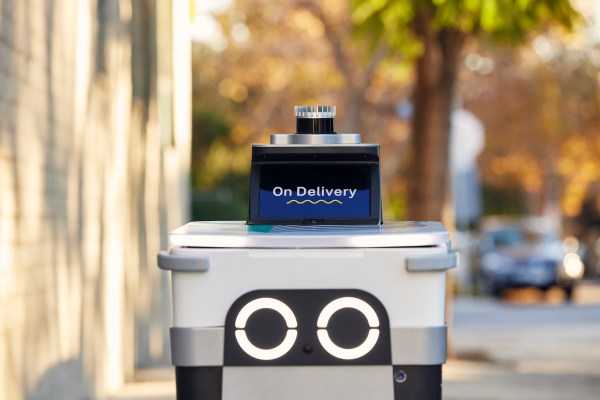Serve Robotics, the autonomous sidewalk delivery robot startup that spun out of Uber’s acquisition of Postmates, is going public via a reverse merger with a blank-check company.
The reverse merger with Patricia Acquisition Corp was completed this month, according to regulatory filings. Ahead of the merger, Serve raised $30 million in a round led by existing investors Uber, Nvidia and Wavemaker Partners. New investors Mark Tompkins and Republic Deal Room also participated. The startup-soon-to-be-public-company has raised a total of $56 million.
Upon the closing of the merger, Uber held a 16.2% stake and Nvidia an 11% stake in Serve, according to regulatory filings. Sarfraz Maredia, Uber’s vice president of delivery and head of its Americas region, has joined Serve’s board.
Serve Robotics started its life as Postmates X, the robotics division of on-demand delivery company Postmates. The autonomous sidewalk robots started delivering to Postmates customers in multiple Los Angeles neighborhoods in 2018. It started a commercial service in 2020.
Uber acquired Postmates in late 2020 for $2.65 billion. Three months later, Postmates X spun out as an independent company called Serve Robotics. The new name was taken from the autonomous sidewalk delivery bot that was developed and piloted by Postmates.
Ali Kashani, who led Postmates X, is co-founder and CEO of Serve Robotics.
Kashani told TechCrunch that he was never in a rush to take the autonomous delivery robot company public. However, he said he sees going public the faster and more efficient way to capitalize.
Serendipity may have also played a role.
Last March, the company was in the midst of raising another round of funding from venture capital firms when concerns about the solvency of Silicon Valley Bank caused one of the largest bank runs in history. Serve, which had 100% of its funds in SVB (all of which were recovered), was suddenly thrust into new, uncertain territory.
The incident caused Kashani to take a closer look at the company’s approach to raising capital. “We needed a broader scope of investors,” he said. It made no sense to stick with one kind of investor.
The blank-check merger opportunity emerged just days later.
Serve said it plans to use the additional financing to enter new markets in the U.S. and advance its technology. The company also plans to scale up its existing 100-robot delivery fleet. Serve has a commercial agreement with Uber to deploy up to 2,000 robots with Uber Eats.
Kashani contends that the company is well positioned to scale and noted that delivery volume has grown more than 30% month-over-month on average for the past 18 months.
“This thing is working — and what it requires is fuel,” he said.
